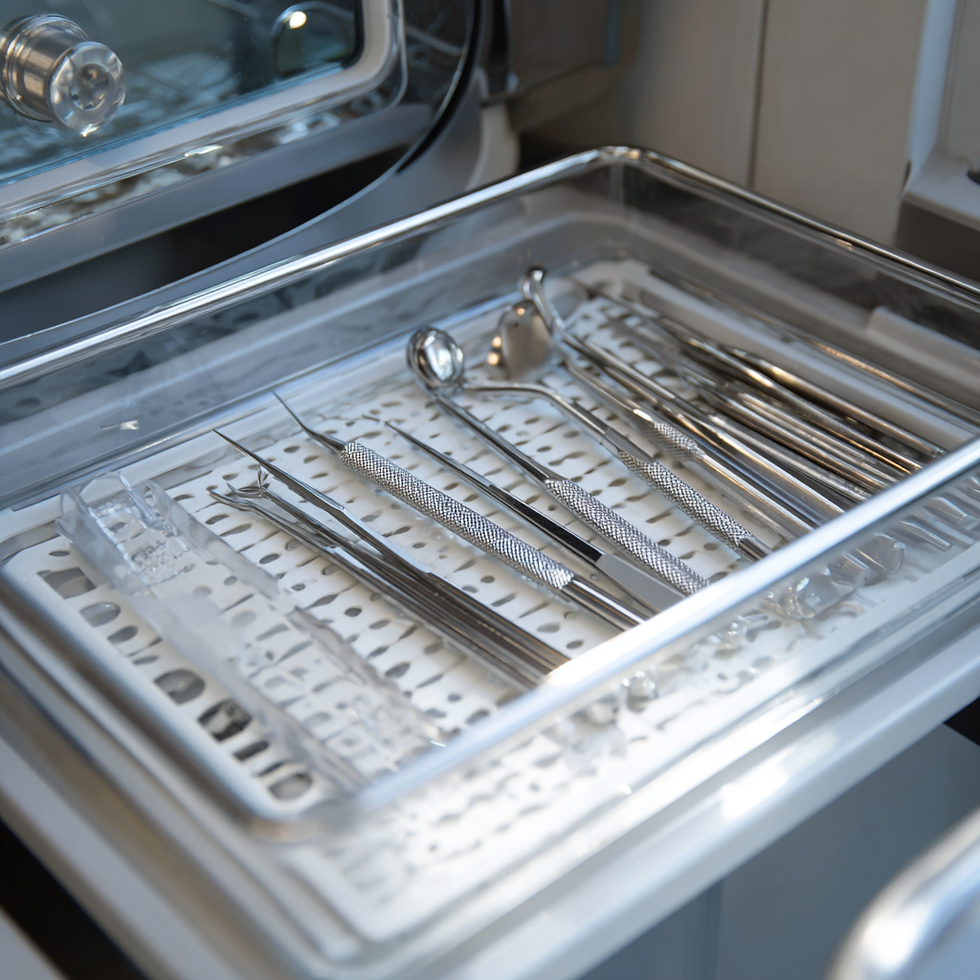Best Foods to Eat After Getting New Dentures for a Comfortable Adjustment
- michaelgrishindent
- Apr 22, 2025
- 4 min read
Updated: Sep 18, 2025

Adjusting to new dentures requires patience, practice, and the right diet. At Grishin Denture Specialist in Spokane, WA, we guide our patients through every step of the transition, including choosing the best foods to make the adjustment period as smooth as possible. Eating with dentures is different from eating with natural teeth, and selecting the right foods can prevent discomfort, improve stability, and help build confidence in chewing.
Why Soft Foods Matter When Adjusting to New Dentures
When first wearing dentures, the gums and oral tissues need time to adapt. Soft foods reduce pressure on healing gums and allow the mouth to adjust to new chewing motions. Nutrient-rich options support overall health while minimizing irritation or soreness.
Best Foods to Eat After Getting New Dentures
1. Smooth Dairy Products for Gentle Nutrition
Dairy products provide calcium and protein, which are essential for maintaining oral health and supporting gum strength. They require minimal chewing and offer a soothing texture for sore gums.
✔️ Yogurt – Smooth and creamy, easy to eat without excessive jaw movement.
✔️ Cottage Cheese – Soft texture with high protein content to aid tissue healing.
✔️ Soft Cheeses – Ricotta, cream cheese, and mozzarella provide nutrition without strain.
✔️ Milk & Smoothies – Fortified with vitamins to support overall wellness.
2. Soft Cooked Vegetables for Fiber and Vitamins
Vegetables remain an essential part of a balanced diet, and cooking them until soft ensures easy chewing without damaging dentures.
✔️ Mashed Potatoes – A staple comfort food that can be enhanced with butter, gravy, or cheese.
✔️ Steamed Carrots & Squash – Soft, naturally sweet, and packed with nutrients.
✔️ Avocados – Creamy and full of healthy fats, easy to mash or eat with a spoon.
✔️ Pureed Soups – Butternut squash, pumpkin, or tomato soup provide warmth and flavor.
3. Protein-Rich Soft Foods for Healing and Strength
Protein aids in gum healing and helps maintain muscle tone in the face. Choosing soft protein sources ensures proper nutrition without unnecessary chewing pressure.
✔️ Scrambled or Soft-Boiled Eggs – Easy to eat and packed with protein and vitamins.
✔️ Tender Fish (Salmon, Cod, Tilapia) – Flaky, mild, and rich in omega-3 fatty acids.
✔️ Ground Turkey or Chicken – Soft, easy-to-chew meat when cooked and mixed with sauces.
✔️ Tofu – A plant-based protein that is soft and absorbs flavors well.
4. Soft Fruits for Natural Sweetness and Hydration
Fruits provide essential vitamins and hydration, keeping the mouth moist and healthy. Choosing softer varieties prevents excessive chewing pressure.
✔️ Bananas – Naturally soft and full of potassium.
✔️ Applesauce – A great alternative to raw apples, which can be difficult to chew.
✔️ Peaches & Pears (Canned or Ripe Fresh) – Gentle on gums and easy to swallow.
✔️ Berries (Mashed or Blended) – Blueberries, strawberries, and raspberries offer antioxidants without tough skins.
5. Whole Grains and Soft Carbohydrates for Energy
Whole grains support digestion and overall health, but choosing softer options prevents unnecessary strain on new dentures.
✔️ Oatmeal – A warm, comforting breakfast full of fiber.
✔️ Soft Pasta (Macaroni, Fettuccine, Lasagna) – Cooked to a tender consistency for easy chewing.
✔️ Rice or Quinoa – Soft grains that provide lasting energy.
✔️ Soft Bread (Without Hard Crusts) – A good base for spreads like peanut butter or avocado.
Foods to Avoid with New Dentures
To prevent discomfort, damage, or difficulty adjusting, certain foods should be avoided, especially in the first few weeks:
❌ Hard, Crunchy Foods – Raw carrots, nuts, popcorn, and crusty bread can cause irritation and dislodge dentures.
❌ Sticky Foods – Chewing gum, caramel, and sticky candies can pull dentures out of place.
❌ Tough Meats – Steak, pork chops, and jerky require excessive chewing pressure.
❌ Small Seeds & Nuts – Can get trapped under dentures, causing discomfort.
❌ Highly Acidic Foods – Citrus fruits and vinegar-based dressings may irritate sensitive gums.
Tips for Eating Comfortably with New Dentures
• Cut food into smaller pieces – Smaller bites reduce strain and make chewing easier.
• Chew evenly on both sides – Helps keep dentures stable and prevents tilting.
• Take slow, controlled bites – Rushing can cause discomfort or dislodge dentures.
• Use denture adhesive if needed – Provides extra security when eating.
• Stay hydrated – Drinking water between bites prevents food from sticking to dentures.
Adapting to Eating with Dentures: What to Expect
It takes time for the mouth to adjust to new dentures. Patients may experience increased saliva production, mild soreness, and an adjustment period before chewing feels natural. Practicing with soft foods builds confidence and ensures a smoother transition.
For those struggling with fit or discomfort, a specialized denturer like Denturist Michael Grishin can make necessary adjustments to improve comfort and functionality.
Serving Spokane & Surrounding Areas with Expert Denture Care
At Grishin Denture Specialist, we provide expert care to patients in Spokane, Spokane Valley, Cheney, Deer Park, and Liberty Lake, ensuring a comfortable, natural fit for every patient.
Conclusion

Choosing the right foods after getting dentures helps ease the transition, reduces discomfort, and supports overall health. Soft, nutrient-rich foods provide essential vitamins while minimizing chewing strain. By following a well-balanced diet and seeking professional guidance from a denturer near me, patients can enjoy a smooth adjustment to their new dentures. For expert denture care, adjustments, and guidance, trust the specialists at Grishin Denture Specialist in Spokane, WA.
Learn how to safely enjoy hot drinks without damaging your dentures in this expert guide.
Stay Connected!
Instagram: @grishindentures
Facebook: GrishinDentureSpecialist
Twitter/X: @grishindentures



